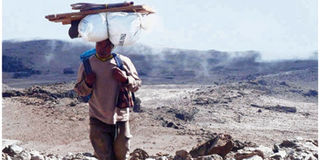Kilimanjaro trekking organisation denies allegations of unfair trade claims

A porter climbs Mt Kilimanjaro with a load on his head. PHOTO | FILE
What you need to know:
- KRTO’s CEO, Kelvin Salla, says Kilimanjaro Porters Assistance Project, founded in 2003, is focused on improving the working conditions for porters who rely on trekking for their livelihoods
Moshi. The Kilimanjaro Responsible Trekking Organisation (KRTO) has firmly rejected allegations of unfair trade practices made by some local tour operators.
The nonprofit, dedicated to ethical trekking and environmental conservation on Mount Kilimanjaro, has asserted that these accusations are baseless.
Local tour operators have criticised KRTO for, allegedly, impeding their access to the $50 million Kilimanjaro trekking market.
The operators claim that KRTO's activities, particularly through its Kilimanjaro Porters Assistance Project (KPAP), are undermining their businesses and affect their ability to compete.
In response, KRTO’s CEO, Kelvin Salla, emphasised that KPAP, founded in 2003, is focused on improving the working conditions for porters who rely on trekking for their livelihoods.
“KPAP addresses the exploitation faced by porters by ensuring fair wages, proper gear, three meals a day, adequate sleeping arrangements, and that their loads do not exceed 20 kg,” Salla explained.
Mr Salla highlighted that KPAP maintains rigorous compliance monitoring.
Partner companies must achieve at least 85 percent adherence to maintain their partnership status.
To date, KPAP has monitored over 60 local companies regarding responsible tourism practices at no cost.
In defence of KRTO
A seasoned porter, Mr Innocent Swai, expressed appreciation for KPAP’s impact.
“After many years of struggle, we now receive $10 per day thanks to KPAP's efforts to rectify past injustices,” Mr Swai noted.
A KPAP partner, Pristine Trails, also confirmed that the programme’s alliance is voluntary and free of charge.
KPAP also offers internationally recognised life skills programmes aimed at empowering porters and their communities.
“Early outcomes show progress in financial literacy, household sanitation, and educational opportunities, helping break the cycle of poverty and enhancing community involvement in conservation,” Mr Salla added.
KPAP also organises “Leave No Trace” activities, integrating environmental sustainability with poverty alleviation.
Through the International Mountain Explorers Connection (IMEC), KRTO channels contributions from climbers toward Mount Kilimanjaro’s preservation, demonstrating that ethical trekking can lead to significant ecological and social advancements.
The organisation has also conducted educational workshops for over 172 mountain crew members and Kilimanjaro National Park Authority (KINAPA) cleaners and played a key role in KINAPA’s 52nd anniversary environmental awareness campaign, reaching over 825 mountain crew members.
Despite these efforts, local tour operators have accused KRTO of conducting what they describe as a covert and damaging campaign abroad, particularly through its "responsible tourism" platform.
They argue that this campaign is making it increasingly difficult for native tour companies to compete, resulting in significant business losses.
"KPAP began twenty years ago as a modest initiative defending porters' rights but has since grown into an overwhelming force, effectively pushing local tour firms out of the market," said a representative of a local tour company, Almighty Kilimanjaro Ltd, Mr Yona Samwel.
"Local companies are now compelled to either submit to KPAP’s terms as partners or face the threat of losing our businesses altogether," he added.
KPAP, originally founded to ensure the fair treatment of porters, mandates strict adherence to its responsible travel guidelines, which include providing appropriate climbing gear, fair wages, and reasonable working conditions.
However, Mr Samwel contends that KPAP’s messaging implies non-partner local companies are irresponsible, leading to a decline in their business relationships with foreign travel agents.
"Many foreign travel agents now exclusively collaborate with KPAP-partner companies, most of which are foreign-owned, depriving us of our livelihoods," Mr Samwel noted.
"Local companies comply with Tanzanian laws and regulations, so why are we being forced to become KPAP partners?" he questioned.
At the heart of the issue is KPAP's list of "responsible" tour operators, a designation that has become critical in the highly competitive Kilimanjaro trekking market. Currently, KPAP lists 150 companies, with 105 being foreign-owned and only 45 local.
A prominent leader among Kilimanjaro porters, Edson Mpemba, expressed deep concern over the rising unemployment among the 16,000 porters reliant on local companies.
"Our porters are losing jobs at an alarming rate," Mpemba said.
"If local companies go under, thousands of porters will be left jobless. This is not just about business—it’s about the livelihoods of those who depend on this mountain," he noted.
In defence, Mr Kelvin Salla highlighted that the organisation has certified 16 porters and guides as Leave No Trace (LNT) trainers and assistant trainers.
The organisation has also empowered over 4,000 local residents through initiatives such as budgeting classes, organic farming workshops, and entrepreneurship training.
KRTO has further facilitated the creation of five village savings and loan associations (VSLA), benefiting over 100 members, and has provided first aid training to enhance community preparedness.
Since its inception, KPAP and KRTO have loaned over 37,000 pieces of equipment to mountain crews free of charge, supporting over 8,000 crew members and generating more than 67,000 job opportunities from monitored climbs in 2023 alone.





